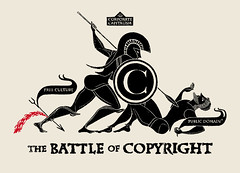 In June, I blogged about "Orphan Works and Mass Digitization: A Report of the Register of Copyright"and noted that there was a period for public comments. That period closed on Oct 9, 2015 and resulted in 83 comments. It is worthwhile looking at the list to see who submitted comments, and whether your professional association is among them. Yes, among the comments are people and organizations who are "pro" the idea being put forth (extended collective licensing) and those who are against it. One of the people against it is Dr. Cory Doctorow, who eloquently wrote:
In June, I blogged about "Orphan Works and Mass Digitization: A Report of the Register of Copyright"and noted that there was a period for public comments. That period closed on Oct 9, 2015 and resulted in 83 comments. It is worthwhile looking at the list to see who submitted comments, and whether your professional association is among them. Yes, among the comments are people and organizations who are "pro" the idea being put forth (extended collective licensing) and those who are against it. One of the people against it is Dr. Cory Doctorow, who eloquently wrote:As someone who depends on archives and libraries for research in my daily creative
labor, I count myself lucky to live in an era of such unprecedented access to works spanning many eras and regions.
At the same time, I'm also frustrated by collateral damage arising from the abolition of formalities for copyright registration, coupled with the extension of copyright terms. These two facts mean that much of the ephemera that tells the stories of everyday people from bygone eras are automatically copyrighted, with no visible rightsholder. They're orphan works, without any significant commercial value, but nevertheless protected by the "author's monopoly" for periods that will certainly outlast my life -- and my daughter's. In many (if not most) cases, it's likely that all extant copies will have vanished before they return to the public domain.The Copyright Office web page says that after the comment period, they will:
...seek to facilitate further discussion through stakeholder meetings and, if necessary, additional requests for written comment. Based on this input, the Office will draft a formal legislative proposal for Congress’s consideration.However, I see no indication that this work is continuing. I am, though, heartened by the words of the Register of Copyrights, Maria Pallante, during Congressional testimony on Dec. 2, 2015, when she said:
...I want to underscore that copyright law is chasing an exponential increase in the way people create, distribute, and consume copyrighted works.Let us hope the Copyright Office catches up AND begins to lead the effort in allowing more equitable use of copyrighted materials.
No comments:
Post a Comment